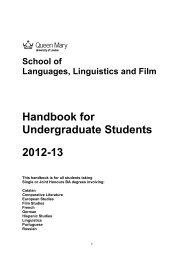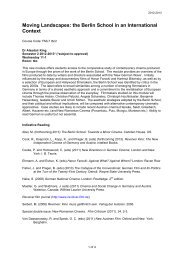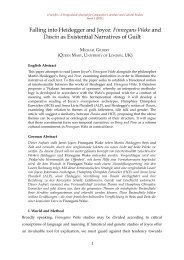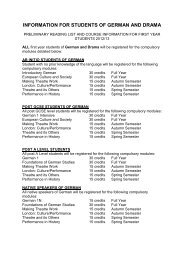Create successful ePaper yourself
Turn your PDF publications into a flip-book with our unique Google optimized e-Paper software.
eTransfers. A Postgraduate eJournal for Comparative Literature and Cultural Studies<br />
Issue 1 (2011)<br />
nomenon of cognition in such a holistic way are known as situated approaches. They<br />
define cognition as social, embodied, concrete, located, engaged and specific. In<br />
short, situated approaches regard cognition as centred in a subject who is him- or<br />
herself situated in a social and material context. Interest in situated cognition<br />
emerged in the 1980s in reaction to the classical, mainly computational approach,<br />
which conceived of cognition as individual, rational, abstract, detached and general.<br />
In other words, classical approaches to researching cognition treat the mind in an ab-<br />
stract way and in isolation from its concrete surroundings. 2 Literary fiction will be in-<br />
troduced here as a medium for representing cognition “within its natural context”, as<br />
Colleen Seifert specifies the goal of situated approaches. 3<br />
To explore the epistemic power of literary fiction, this paper will proceed in three<br />
steps. The next section will discuss the nature of scientific knowledge in more detail<br />
and will justify the claim that knowledge can be formed on the basis of literary fic-<br />
tion. Section III will introduce two types of knowledge that can be identified in fic-<br />
tional writing in addition to ‘knowing-that’. Section IV will return to Ian McEwan’s<br />
<strong>Saturday</strong> as a case study to support the claims made in this paper. <strong>Saturday</strong> is a novel<br />
which not only incorporates, develops and interconnects different types of know-<br />
ledge of cognition, but which also makes its protagonist’s cognition comprehensible<br />
from a first-person perspective. In pursuit of this argument, the analysis will concen-<br />
trate on a sample passage from <strong>Saturday</strong>, exploring the connective and process-like<br />
knowledge of cognition that is generated by this piece of literary fiction.<br />
II. Narrative Fiction as an Epistemic Force<br />
Most received concepts of knowledge treat knowledge in terms of facts that can be<br />
known, a type of knowledge that is framed in propositions, which is why it is called<br />
2 On the differentiation between situated and classical approaches in cognitive science see Brian Cantwell<br />
Smith, “Situatedness/Embeddedness,” in The MIT Encyclopedia of the Cognitive Sciences, eds.<br />
Robert A. Wilson and Frank C. Keil (Cambridge, Mass. and London: The MIT Press, 1999), 769-771,<br />
here: 769.<br />
3 Colleen M. Seifert, “Situated Cognition and Learning,” in The MIT Encyclopedia of the Cognitive Sciences,<br />
eds. Robert A. Wilson and Frank C. Keil (Cambridge, Mass. and London: The MIT Press,<br />
1999), 767-769, here: 767.<br />
4







